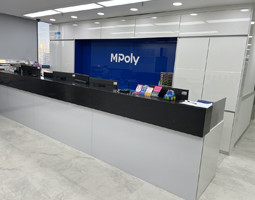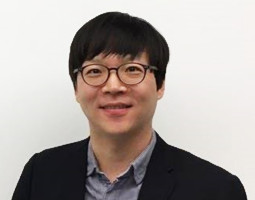
MPoly Mokdong (3/3)
MPoly Mokdong Teacher FAQ
We're here to answer some of the frequently asked questions about MPoly Mokdong. 1. What should potential teachers take into consideration before applying? Prospective teachers should be ready for a fast-paced, challenging environment where they can grow quickly and make an immediate impact. It’s a rewarding place to work with advanced-level students, but it requires energy, adaptability, and a willingness to get started right away. 2. What does a typical school day look like for teachers? Teachers typically teach between five to seven classes per day, starting around 2:15 PM, though this can vary during testing periods. Each teacher is responsible for planning and delivering their own lessons and managing their classrooms. The school day ends at approximately 10:15 PM. Mornings are free, allowing staff time for personal activities such as exercise, errands, or socializing. 3. What kind of training or onboarding is provided to new teachers? New teachers receive at least one week of training. Teachers are provided key teaching materials, such as textbooks and workbooks, to review independently. During the first week, they shadow experienced teachers to learn about daily routines, lesson timing, and test schedules. Ongoing support is always available. Our team understands what it’s like to be new, and senior staff members are always ready to answer questions and offer guidance. 4. What can be expected in terms of work-life balance and support? While the workload can be busy at times, teachers are given sufficient prep time during the day to plan lessons, mark work, and create materials, so there’s rarely a need to take work home. The school day runs from 2:15 PM to 10:15 PM, leaving mornings free for personal time. Weekends are generally off, with only occasional Saturday commitments once or twice a year, such as debate competitions. Teachers also receive national holidays off, plus a week-long break in both summer and winter. Additional personal leave can be arranged when needed. Support is strong across the team, and staff regularly help one another with day-to-day tasks to ensure a manageable and balanced workload. 5. What are the expectations regarding lesson planning, classroom management, and communication with parents? Teachers are provided with a full curriculum, including textbooks and PowerPoints. While lesson materials are already prepared, teachers can adapt or supplement them to suit their style or address specific class needs. There is a set syllabus to follow, especially as students take monthly tests, but teachers have flexibility in how they deliver lessons. New teachers are observed early on to ensure they are comfortable with the materials and effective in the classroom. After that, they are trusted to manage their classes independently, with no micromanagement. Classroom management is the teacher’s responsibility, but support is always available from senior management or Korean homeroom teachers if needed. Foreign teachers do not communicate directly with parents; instead, they are expected to keep Korean homeroom teachers informed about any issues so they can handle parent communication appropriately. 6. How is the overall teaching environment? The teaching environment is supportive and collaborative. Our teachers take pride in their work and share responsibilities fairly—for example, tasks like grading essays after monthly tests are distributed evenly to ensure no one is overwhelmed. 7. What opportunities exist for professional growth and career development? New teachers typically start with lower-level classes to get familiar with the curriculum and classroom environment. As they gain experience and demonstrate their strengths, there are opportunities to progress to teaching higher-level students, including 8th and 9th grades, which involve more advanced materials and test preparation. There are also career development opportunities beyond the classroom. Teachers can get involved with curriculum development, test creation, and other projects through our headquarters. Additionally, we occasionally hold workshops to share teaching strategies and classroom techniques. We value long-term staff, as consistency benefits both students and teachers. Building strong, lasting relationships helps create a more effective and supportive academic environment. 8. What support systems are available for teachers experiencing difficulties? We prioritize the well-being of our teachers, both inside and outside the classroom. Adjusting to a new country and workplace can be challenging, so we’ve built a strong support network. Teachers can always turn to their colleagues, management, or the front desk team for help, whether it's about teaching, housing, or general day-to-day concerns. Weekly foreign teacher meetings are held every Monday to address updates, resolve issues, and provide ongoing support. There are also monthly all-staff meetings led by the director to outline important events and announcements. 9. What is the surrounding area like where the school is located? The school is located in a convenient area with easy access to transportation. Sinmokdong Station is a 7-minute walk away, connecting to major areas, including the airport and trendy spots. There are plenty of good restaurants and smaller shops nearby for everyday groceries. 10. Is housing provided for teachers? The school provides housing. While most teachers’ housing is provided at no extra cost, some may choose to upgrade or share with a partner. The accommodations come with essential amenities, such as air conditioning, heating, free Wi-Fi, and access to recycling facilities. If any issues arise with housing, the front desk team is responsive and will resolve concerns quickly, usually within a few days. The accommodation is conveniently located within a 5 to 20-minute walk from our school. 11. What leisure, travel, or cultural opportunities are accessible to teachers? While holidays are typically one to two weeks long, Korea's central location makes it easy to travel to popular destinations such as Japan, the Philippines, and China, with flights taking about three hours. During long weekends, we encourage teachers to explore Korea itself, with must-see locations like Jeju Island, Busan, and the seaside area of Sokcho. 12. Is there any additional advice that would benefit prospective teachers? We recommend embracing the challenge of connecting with students and colleagues. Building genuine relationships is just as important as the lessons you teach. When students see that you care, they’ll respect you and be more engaged. Additionally, while you'll often work independently, it’s important to rely on colleagues when needed and be flexible, as things can change quickly.


